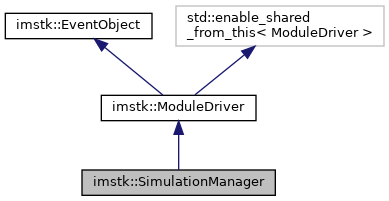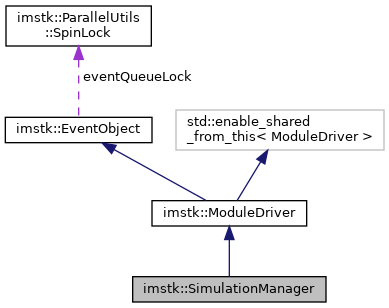Defines a sequential substepping approach to driving the modules and rendering. The user provides a desired timestep and as it runs it accumulates time. It then determines how many simulation steps before every render (simply accumulated time / timestep = substeps). The remainder is divided out over the substeps. This is the preferred driver. todo: Timestep smoothening. More...
#include <imstkSimulationManager.h>


Public Types | |
| enum | ThreadingType { TBB, STL } |
 Public Types inherited from imstk::EventObject Public Types inherited from imstk::EventObject | |
| using | Observer = std::tuple< bool, std::weak_ptr< EventObject >, std::function< void(Event *)> > |
Public Member Functions | |
| SIGNAL (SimulationManager, starting) | |
| Called after initialization but before starting the loop. | |
| SIGNAL (SimulationManager, ending) | |
| Called after ending, but before un initialization. | |
| void | start () override |
| void | addModule (std::shared_ptr< Module > module) override |
| Add a module to run. More... | |
| void | clearModules () override |
| Remove all modules. | |
| void | setDesiredDt (const double dt) |
| Sets the target fixed timestep (may violate), seconds This ultimately effects the number of iterations done default 0.003. | |
| double | getDesiredDt () const |
| double | getDt () const |
| Get the current actual timestep. | |
| void | setThreadType (ThreadingType threadType) |
| Set the thread type to run the parallel modules with. | |
| void | setUseRemainderTimeDivide (const bool useRemainderTimeDivide) |
| The number of substeps is computed as N = (accumulated time / desiredDt). This leaves a remainder. Off gives a completely fixed timestep, on provides semi-fixed timestep. When off, the remainder is accumulated for later iterations, causing extra iterations now and then (possible stutter). When on, the remainder time is divided out over the N substeps. | |
| bool | getUseRemainderTimeDivide () const |
 Public Member Functions inherited from imstk::ModuleDriver Public Member Functions inherited from imstk::ModuleDriver | |
| void | requestStatus (ModuleDriverStatus status) |
| ModuleDriverStatus | getStatus () const |
| std::vector< std::shared_ptr< Module > > & | getModules () |
| void | waitForInit () |
| Wait for all modules to init. | |
 Public Member Functions inherited from imstk::EventObject Public Member Functions inherited from imstk::EventObject | |
| template<typename T > | |
| void | postEvent (const T &e) |
| Emits the event Direct observers will be immediately called, in sync Queued observers will receive the Command in their queue for later execution, reciever must implement doEvent. | |
| template<typename T > | |
| void | queueEvent (const T &e) |
| Queues event directly to this. | |
| void | doEvent () |
| Do an event, if none exists return. | |
| void | doAllEvents () |
| Do all the events in the event queue. | |
| void | foreachEvent (std::function< void(Command cmd)> func) |
| Thread safe loop over all event commands, one can implement a custom handler. | |
| void | rforeachEvent (std::function< void(Command cmd)> func) |
| thread safe reverse loop over all event commands, one can implement a custom handler | |
| void | clearEvents () |
| Removes all events from queue cleans up copies of the event. | |
Protected Member Functions | |
| void | requestStop (Event *e) |
| void | runModuleParallel (std::shared_ptr< Module > module) |
Protected Attributes | |
| std::vector< std::shared_ptr< Viewer > > | m_viewers |
| std::unordered_map< Module *, bool > | m_running |
| std::vector< std::shared_ptr< Module > > | m_syncModules |
| Modules called once per update. | |
| std::vector< std::shared_ptr< Module > > | m_asyncModules |
| Modules that run on completely other threads without restraint. | |
| std::vector< std::shared_ptr< Module > > | m_adaptiveModules |
| Modules that update adpatively to keep up with real time. | |
| ThreadingType | m_threadType = ThreadingType::STL |
| double | m_desiredDt = 0.003 |
| Desired timestep. | |
| double | m_dt = 0.0 |
| Actual timestep. | |
| int | m_numSteps = 0 |
| bool | m_useRemainderTimeDivide = true |
| Whether to divide out remainder time or not. | |
 Protected Attributes inherited from imstk::ModuleDriver Protected Attributes inherited from imstk::ModuleDriver | |
| std::vector< std::shared_ptr< Module > > | m_modules |
| std::atomic< ModuleDriverStatus > | simState = { ModuleDriverRunning } |
 Protected Attributes inherited from imstk::EventObject Protected Attributes inherited from imstk::EventObject | |
| ParallelUtils::SpinLock | eventQueueLock |
| std::deque< Command > | eventQueue |
| std::vector< std::pair< std::string, std::vector< Observer > > > | queuedObservers |
| std::vector< std::pair< std::string, std::vector< Observer > > > | directObservers |
Detailed Description
Defines a sequential substepping approach to driving the modules and rendering. The user provides a desired timestep and as it runs it accumulates time. It then determines how many simulation steps before every render (simply accumulated time / timestep = substeps). The remainder is divided out over the substeps. This is the preferred driver. todo: Timestep smoothening.
Events: Posts EventType::Start just before the beginning of the loop, posts EventType::Stop just after the processing loops is being exited
Definition at line 30 of file imstkSimulationManager.h.
Member Function Documentation
◆ addModule()
|
overridevirtual |
Add a module to run.
- Parameters
-
The module to run
Reimplemented from imstk::ModuleDriver.
Definition at line 193 of file imstkSimulationManager.cpp.

The documentation for this class was generated from the following files:
- Source/SimulationManager/imstkSimulationManager.h
- Source/SimulationManager/imstkSimulationManager.cpp
 1.8.13
1.8.13